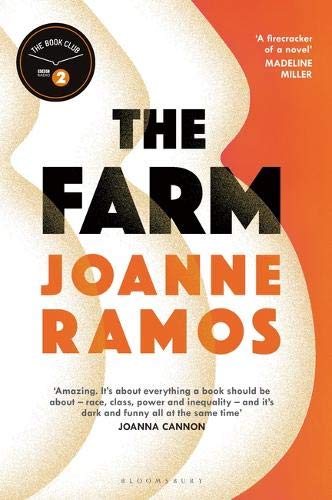You have no items in your cart. Want to get some nice things?
Go shopping
Several years ago, Joanne Ramos picked up a copy of the Wall Street Journal and read a small article about a surrogacy facility in India that made her wonder, what if…? What if clients weren’t just well-off but super-rich? What if a business model for pregnancy existed in an ultra-capitalist economy?
Golden Oaks is the titular ‘farm’, a ‘gestational retreat’ in rural upstate New York where the surrogates – labelled ‘Hosts’ – have access to the very best healthcare and are pampered with massages, yoga classes, chef-prepared meals and cashmere loungewear. On the surface it sounds pretty cushy, until you realise there are rules and restrictions that mean the facility is more like an Orwellian prison than a spa.
The Hosts, who are mostly black or Filipino, have signed away their rights to decide what happens to their own bodies. They are monitored via cameras and wristbands that track their every move. They are made to give up their cell phones and must earn visitation rights. They can’t take pain medication in case it harms the baby. Chocolate bars are off limits. To go for a walk, they must take a companion. And all of this for a small salary, as the draw – the big fat bonus – is only paid upon delivery of a healthy child.
Ramos, who was born in the Philippines and moved to the US as a child, tells the story through the experiences of four women. At the heart of the novel are Jane, a Filipino new mother struggling to provide for her baby, and her elderly cousin Ate, with whom she shares a dorm room in Queens. Ate is driven and entrepreneurial – a baby nurse so adored by her wealthy white clients that they plan their pregnancies around her availability. Her plan to set Jane up as a nanny fails when Jane is sacked for suckling her client’s newborn, and so she recommends Golden Oaks, where ‘The work is easy and the money is big!’
At the Farm, Jane meets Regan: white, pretty, educated, and thus considered to be a ‘Premium Host’. Regan has been recruited by the facility’s ruthlessly ambitious director Mae Yu, a Harvard School Business graduate. While idealistic Regan would like financial independence from her domineering father, surrogacy offers her something far more valuable: a purpose, the conviction that she is doing some good in the world. Conversely, Mae has her eye firmly on the prize. She wants to match Regan with ageing billionaire Madame Deng, anticipating a ‘record-breaking year-end bonus’ that will allow her to remodel her bathroom and buy her mother a Hermès bag.
Despite the obvious comparisons to Margaret Atwood’s The Handmaid’s Tale, Mae is not made in Aunt Lydia’s brutal image. She is the epitome of hard-nosed corporate ambition, commoditising her employees by referring to them by number rather than name (Jane is 84, Regan, 82). But she also believes they should be treated well and compensated fairly for their labour. In a free market economy, she sees surrogacy as a golden opportunity, a fair exchange through which the Client and the Host both become better off. Ramos’s background in finance renders Mae’s business-speak utterly convincing – her baby farm, a five-minutes-in-the-future reality rather than dystopian fiction.
The Farm is perfect for book clubs because, as with The Help, issues of race, class, power and inequality emerge from a brilliantly page-turning, character-driven narrative. Ramos possess a sharp wit, and her satire of the Manhattan elite is particularly enjoyable. When Mrs Richards, well-meaning Upper East Side white saviour, tries to film Jane with her iPhone for a documentary she’s making about Filipino help, and little Lulu begins to choke on her ‘superfood’ snack, her not-wholly-appropriate emotional reaction says it all: ‘Those. Blueberries. Will. STAIN.’
But on the important issue of surrogacy, Ramos refuses to moralise. Jane, Ate, Regan and Mae are delicately drawn, and despite their different levels of education and wealth, they are united in striving for a better life, motivated – primarily – by the bedrock of family. Race and gender do not determine which side of the argument the women are on, and it is left up to the reader to decide where they stand on the rights and wrongs of consent in a system of privilege.
I suspect some readers will find the ending too neat. Mae is redeemed through the birth of her own child, and Jane seems happy to be employed as her live-in nanny. Are we to believe, then, that friendliness and compassion legitimise the system? Early in the novel, Ate asserts, ‘I have relationships, not only clients’, and produces holiday cards as evidence of her status within the families she’s cared for. But where are they when she falls ill and can’t work? Who is there to look after her? By upholding the status quo, I believe Ramos is challenging us to evaluate the immigrant experience and a certain kind of blind servitude to the American Dream. One thing is certain, this entirely plausible snapshot of a future baby economy will spark debate.
The Farm is out now from Bloomsbury.
About Jennifer Kerslake
Jennifer Kerslake is an editor and writer. Born in Devon, she now lives in London where she works for the Orion Publishing Group.




